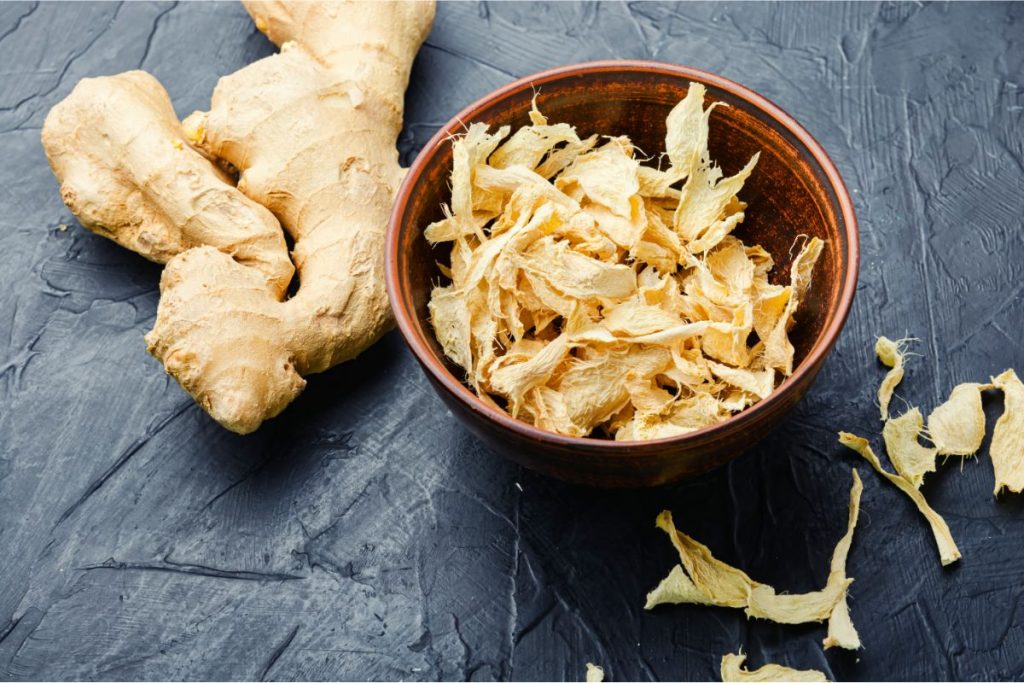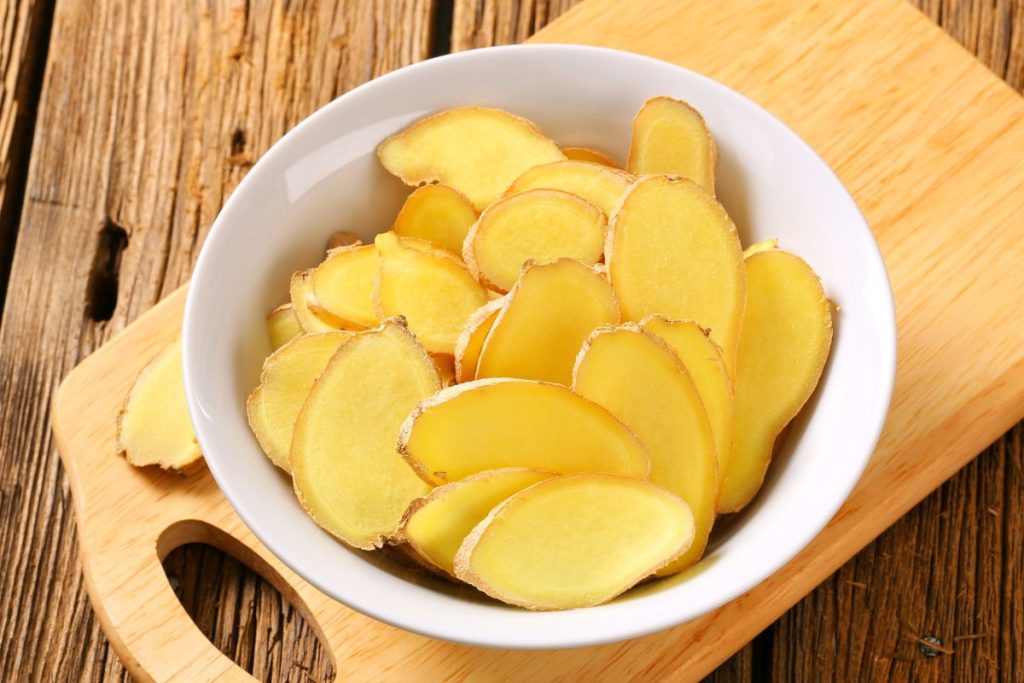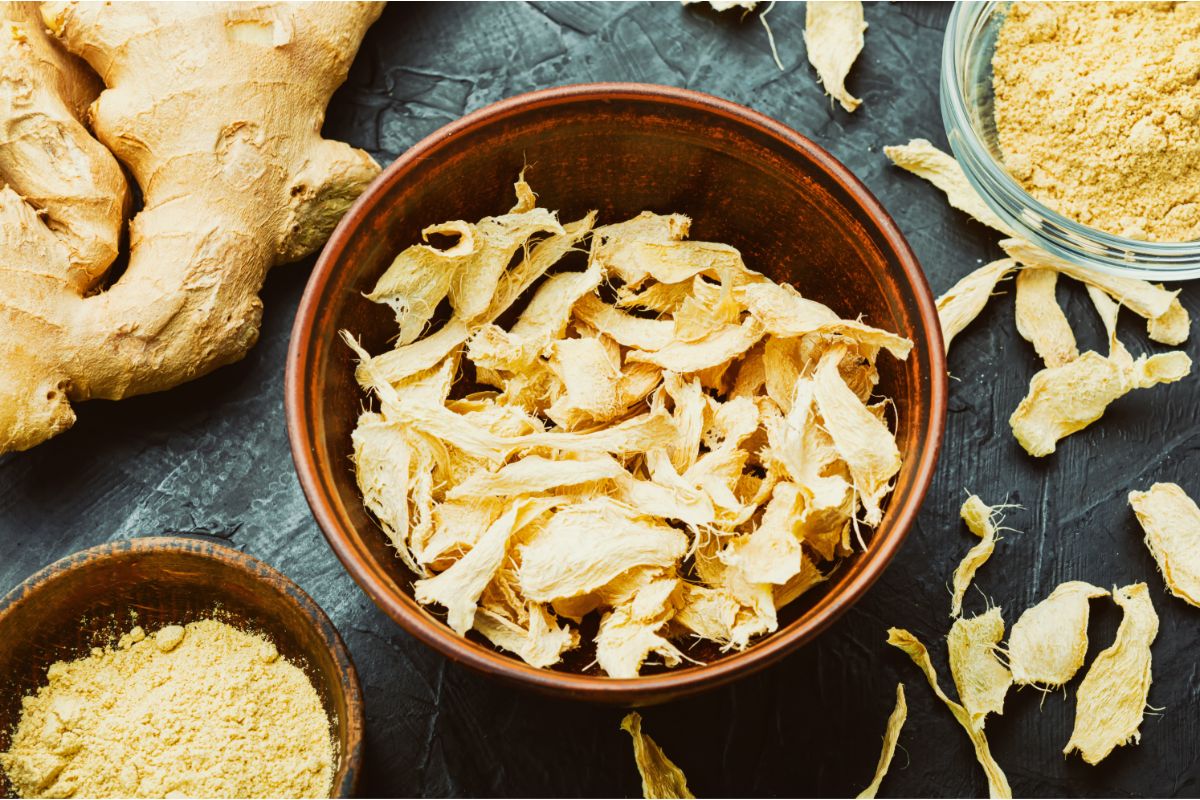To dehydrate ginger, wash, peel, and cut the ginger root into thin slices. Place the ginger pieces on food dehydrator trays and dry at 135°F for 3 to 4 hours. Dehydrated ginger can be ground into ginger powder and mixed in hot water to make ginger tea.
Table of Contents
What is the Best Way to Dehydrate Ginger?
The best way to dehydrate ginger is in a food dehydrator because it prevents the growth of mold, yeast, and bacteria while maintaining the nutrients of fresh ginger. Dehydrators offer even heat, and remove moisture slowly, which helps to turn fresh ginger root into a steady supply of dried ginger for use in teas, curries, baking, soups, and more.

How Do You Prepare Ginger for Dehydration?
How to Peel Ginger Root
If the ginger skin is woody and tough, start by peeling it. To get the job done easily and quickly, use a vegetable peeler or the back of a spoon. A spoon is better than a knife to remove the skin while leaving more of the ginger intact.
How to Slice Ginger Root
There are multiple ways to slice the ginger for dehydration:
- Mincing: If you have a lot of ginger to dry, consider mincing it before dehydrating. This method is perfect for bulk drying ginger because it is fast, and the small pieces can easily be ground into powder.
- Slicing: Use a mandolin or a sharp knife to cut the ginger into 1/8-inch thick slices.
- Grating or shredding: Grating and shredding help to make small pieces of ginger, but much of the juice and flavor is lost in the process.

How to Dehydrate Ginger at Home
It’s easy to dehydrate ginger root at home in a food dehydrator. This is the most effective method for drying ginger because the dehydrator ensures proper air circulation for even drying.
Here’s how to make your own dehydrated ginger using a food dehydrator:
- Wash the ginger roots or rhizomes carefully to remove dirt and debris.
- Peel the ginger roots with a vegetable peeler or the back of a spoon.
- Using a mandoline, cut the ginger root into thin, 1/8-inch-thick slices. The more uniform the slices, the better to ensure even dehydration.
- Arrange the ginger pieces on dehydrator trays in a single layer, ensuring the pieces don’t overlap.
- Dehydrate ginger slices at 135°F for 3 to 4 hours or until fully dried and break when bent.
- Remove some slices from the dehydrator and let them come to room temperature. If the pieces are still moist or sticky, then return them to the dehydrator and dry them a little longer. Dried ginger will have a crunchy texture and no visible moisture.
- Let the dried ginger cool for 5 to 10 minutes. If you want to grind your dehydrated ginger into ginger powder, grind what you intend to use with a spice grinder or coffee grinder and leave the rest whole.
- Store the dried ginger slices in airtight containers such as glass jars or Mylar bags. Store them in a cool, dry place away from direct sunlight.
Is Dehydrated Ginger as Good as Fresh Ginger?
Dehydrated ginger concentrates the flavor of fresh ginger, making it more intense. It is a fantastic way to add flavor and nutrition to your dishes and has a longer shelf life than fresh ginger.
However, some of the vitamins present in fresh ginger may be destroyed by the dehydrating process, including vitamin C. Fortunately, most of the powerful antioxidants are preserved when drying ginger.
Is Dehydrated Ginger Good For You?
Dehydrated ginger is healthy and can be consumed or added to recipes to impart ginger flavor. Here are the key health benefits of consuming dehydrated ginger:
- Dried ginger contains various minerals, including calcium, iron, sodium, folate, zinc, phosphorus, niacin, and riboflavin.
- Dried ginger is a good source of vitamin B6, vitamin C, magnesium, and potassium.
- Dried ginger supports weight loss by boosting digestion. It helps regulate fat absorption and speeds up metabolism.
- Ginger contains a phenolic compound known as gingerol, which has powerful antioxidant and anti-inflammatory properties, making dried ginger one of the most powerful anti-inflammatory foods in the world.
- Small doses of ginger tea may help with nausea, headaches, and morning sickness in pregnant women, but it is important to only add ginger with physician approval.
- The anti-inflammatory properties of shogaols in dried ginger can help ease symptoms of the common cold.

What is Dehydrated Ginger Used For?
With so many culinary uses and health benefits, dehydrated ginger is a basic pantry staple. You can use dehydrated ginger in a variety of ways:
- Create seasoning blends at home instead of using store-bought ginger powder
- Dehydrated ginger powder can add flavor to baked goods
- Dry ginger powder can be used to prepare ginger tea
- It can be added to homemade marinades and BBQ rubs
- It can be used to make candied ginger
- Mixing some dried ginger powder with honey makes a yummy spread for toast
How to Make Ginger Tea from Dehydrated Ginger
You can use dried ginger, ginger powder, or fresh ginger to make ginger tea. Here’s how to make homemade ginger tea using dehydrated ginger:
- Use a tea kettle or pot to boil several cups of filtered, fresh water.
- Add cinnamon and ground ginger powder to the hot water.
- Stir well, and add honey and lemon juice to taste.
- Let the mixture steep for a few minutes.
- Strain the mix through a sieve and enjoy your ginger tea, iced or hot.

Shelf Life and Storage of Dehydrated Ginger
Dehydrated ginger slices have a longer shelf life than fresh ginger and can last up to two years.
Tips for Storing Dried Ginger
- Store dried ginger in airtight containers such as glass Mason jars or vacuum-seal bags.
- Place the containers of dehydrated ginger in a dry, cool place in a well-ventilated room away from direct sunlight and heat sources.
- Store dehydrated ginger at least 6 inches off of the ground to avoid pests and temperature fluctuations.
- Package ginger that will be used or opened repeatedly in smaller containers and keep them in the refrigerator to avoid oxygen and moisture exposure.

